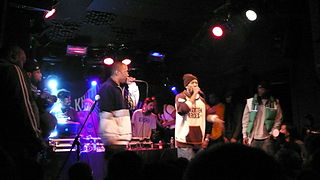
Brand Nubian is an American hip hop group from New Rochelle, New York, composed of three emcees, and formerly three DJs. Their debut studio album, One for All (1990), is one of the most popular and acclaimed alternative hip hop albums of the 1990s, known for socially conscious and political lyrics inspired by the teachings of The Nation of Gods and Earths. In 2008, About.com placed the group on its list of the 25 Greatest Rap Groups of All Time.
"La Bamba" is a Mexican folk song, originally from the state of Veracruz, also known as "La Bomba". The song is best known from a 1958 adaptation by Ritchie Valens, a Top 40 hit in the U.S. charts. Valens's version is ranked number 345 on Rolling Stone magazine′s list of the 500 Greatest Songs of All Time.

"Love Don't Live Here Anymore" is a song written by Miles Gregory and originally recorded by Rose Royce. It was produced by former Motown songwriter and producer Norman Whitfield for Whitfield Records. Lead vocals were sung by Gwen Dickey and the song was released as the second single from their third studio album Strikes Again. The song was developed as a result of producer Whitfield's interest to work with Paul Buckmaster, the British arranger and composer. Together they asked songwriter Miles Gregory to write a song for them. Gregory's undergoing medical care for his deteriorating physical health became the inspiration behind the song. "Love Don't Live Here Anymore" incorporated the use of the Pollard Syndrum TwinDrum, and was one of the first songs to effectively use the sound reverbs of the instrument. The song was mainly recorded at music contractor Gene Bianco's house, where Dickey was present during the recording.

"Hips Don't Lie" is a song by Colombian singer-songwriter Shakira, featuring Haitian rapper Wyclef Jean, released by Epic Records in 2006 as the second single from Shakira's seventh studio album, Oral Fixation, Vol. 2 (2005). Shakira and Jean wrote the lyrics and jointly composed the music with additional co-writing by Shakira's percussionist Archie Pena. The song was produced by Shakira and Jean with additional co-production by Jerry Duplessis. "Hips Don't Lie" is a reworking of Jean's earlier single "Dance Like This", therefore it features additional composing credits by Omar Alfanno, Duplessis, Luis Días, and LaTavia Parker. The song incorporates samples from "Amores Como el Nuestro" written by Alfanno, and "Carnaval " written by Días.
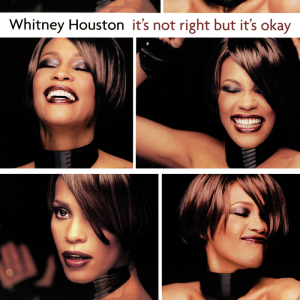
"It's Not Right but It's Okay" is the third single from American singer Whitney Houston's fourth studio album, My Love Is Your Love. It was written by Houston, LaShawn Daniels, Rodney Jerkins, Fred Jerkins III, Isaac Phillips, Toni Estes and produced by Rodney Jerkins, who went by the nickname Darkchild. The song examines a woman confronting her lover about his infidelity. Houston won the 2000 Grammy Award for Best Female R&B Vocal Performance for this song. In 2003, Q Magazine ranked "It's Not Right but It's Okay" at number 638 in their list of the "1001 Best Songs Ever". In 2019, Billboard listed it as one of the Greatest Songs of 1999. In 2022, the Thunderpuss club mix was listed in the list of the 200 greatest dance songs of all time on Rolling Stone. The single reached number one in Spain and the top five in Canada, Iceland, the United Kingdom, and the United States.

"Please Don't Go" is a song written by Harry Wayne Casey and Richard Finch, then members of KC and the Sunshine Band, and released as the second single from the band's sixth album, Do You Wanna Go Party (1979). Cover versions of the song that reached the top songs charts were recorded by Double You (1992), KWS (1992), and Basshunter (2008).

"Don't Say Your Love Is Killing Me" is a song by English synth-pop duo Erasure, released as the second single from their eighth studio album, Cowboy (1997). It is an uptempo dance music song written by Vince Clarke and Andy Bell. Mute Records issued the single in the UK. For the song's release in the United States, Maverick Records requested a remix for radio. The US single version of "Don't Say Your Love Is Killing Me" is different from what is on the Cowboy album; the song's intro was changed, as well as the middle eight section. An entire verse, edited out of the album version, is restored on the American single release.

"Free Your Mind" is a song by American female group En Vogue from their second album, Funky Divas (1992). The track was composed and produced by Foster and McElroy. They were inspired by the Funkadelic song "Free Your Mind and Your Ass Will Follow." The guitar and bass tracks for the song were written and recorded by San Francisco-based guitarist Jinx Jones. The opening line: "Prejudice, wrote a song about it. Like to hear it? Here it go!", is adapted from a line originally used by David Alan Grier's character Calhoun Tubbs from Fox's In Living Color.
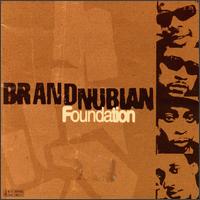
Foundation is the fourth album by hip hop group Brand Nubian. It was released on September 29, 1998, via Arista. The album marked the reunion of the four original members, Grand Puba, Sadat X, Lord Jamar and DJ Alamo, who hadn't released an album together since their 1990 debut One for All.

"Live and Let Die" is the theme song of the 1973 James Bond film of the same name, performed by the British–American rock band Wings. Written by English musician Paul McCartney and his wife Linda McCartney, it reunited McCartney with former Beatles producer George Martin, who produced the song and arranged the orchestra. McCartney was contacted to write the song by the film's producers Harry Saltzman and Albert R. Broccoli before the screenplay was finished. Wings recorded "Live and Let Die" during the sessions for Red Rose Speedway in October 1972 at AIR Studios. It was also the first rock song to open a Bond film. Another version by B. J. Arnau also appears in the film.
"(At Your Best) You Are Love" is a song by R&B group the Isley Brothers. It was originally released on their album Harvest for the World. The song was dedicated to their mother, Sally. Although not a single, the song was a radio hit in 1976, and later became a hit for R&B singer Aaliyah in 1994.

"Don't Let Go (Love)" is a song by American R&B group En Vogue. It was written by Ivan Matias, Andrea Martin, and Marqueze Etheridge, and produced by Organized Noize for the Set It Off soundtrack (1996), also appearing on the group's third album, EV3 (1997). The song was the group’s last single and music video to feature member Dawn Robinson and was En Vogue's biggest international single, making it to the top 10 in several countries. According to Billboard, the single ranked as the 83rd most successful single of the 1990s.
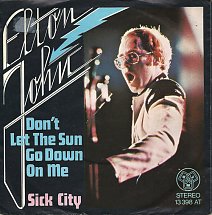
"Don't Let the Sun Go Down on Me" is a song written by English musician Elton John and songwriter Bernie Taupin. It was originally recorded by John for his eighth studio album, Caribou (1974), and was released as a single that peaked at number two on the Billboard Hot 100 chart, and reached number 16 on the UK Singles Chart.

"Let Me Be Your Fantasy" is a song by British musical group Baby D. It was written and produced by band member Floyd Dyce and the vocals were sung by Dorothy Fearon. It was originally released by Production House Records in October 1992, when it reached No. 76 on the UK Singles Chart. In November 1994, London Records subsidiary Systematic re-released the song, and it subsequently became a UK No. 1 hit for two weeks. A partially black-and-white music video was produced to promote the single.
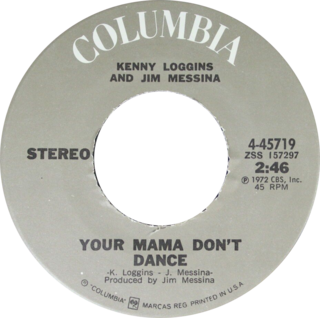
"Your Mama Don't Dance" is a hit 1972 song by the rock duo Loggins and Messina. Released on their self-titled album Loggins and Messina, it reached number four on the Billboard pop chart and number 19 on the Billboard Easy Listening Chart as a single in early 1973.

"Let's Go All the Way" is a song by American musical group Sly Fox. Released as a single in 1985 from their debut studio album of the same name, the record became a sleeper hit, entering the top 10 of the singles charts in both the US and the UK the following year. Despite receiving considerable commercial and critical success, the group failed to match expectations with their later singles, and are sometimes referred to as a one-hit wonder. Original MTV veejay Martha Quinn has described "Let's Go All the Way" as "one of the funkiest songs ever".

"Everybody's Got to Learn Sometime" is a 1980 single written by James Warren and first performed by British pop band the Korgis, with Warren as the lead singer. It has subsequently been covered by numerous other artists.

"Don't You Want Me" is a song recorded by British DJ and producer Francis Wright, known under the pseudonym of Felix, released in July 1992 as his debut single from his album, #1 (1993). Musically, it samples Jomanda's "Don't You Want My Love" and credited as Felix featuring Jomanda. Released on 27 July 1992 by various labels, the song reached number six on the UK Singles Chart reached number one in Finland, Spain, and Switzerland. It also went to number one on the US Billboard Hot Dance Club Play chart and on the European Hot 100 Singles chart. In 1995 and 1996, the song charted in the UK again, but in remixed form. British magazine Mixmag ranked the song number 98 in its "100 Greatest Dance Singles of All Time" list in 1996.
Don't Let It Go to Your Head may refer to:
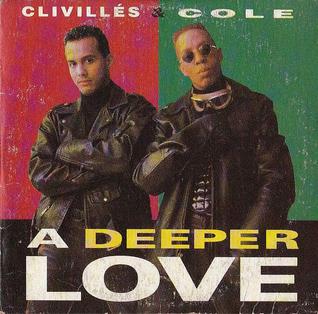
"A Deeper Love" is a song written by American producers Robert Clivillés and David Cole, and performed by them as Clivillés & Cole featuring vocals by Deborah Cooper. Released by Columbia in 1991, the song was the duo's fifth number-one on the US Billboard Hot Dance Club Play chart. On other US charts, "A Deeper Love" peaked at number 83 on the soul singles chart and number 44 on the pop chart. Overseas, especially in Europe the single charted higher, going to number 15 in the UK and number eight on the Dutch Top 40.

















